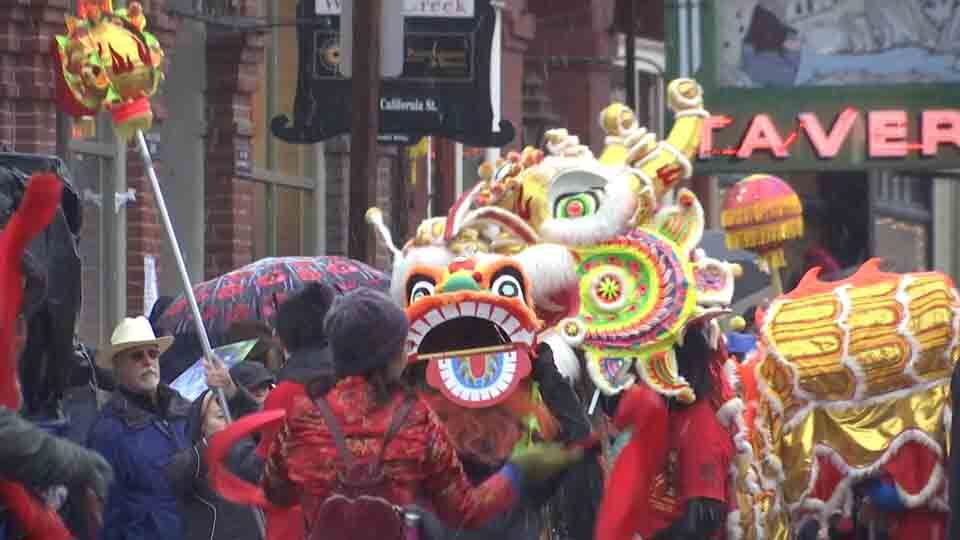Lunar New Year Celebration in Southern Oregon is Set to Ring in the Year of the Dragon

JACKSONVILLE, Ore. — In February, Oregonians celebrate the Lunar New Year. If you have not been to the Jacksonville festival recently, now is the time. The event is free and scheduled for February 17 at the Britt Pavilion Garden, which is close to the oldest Chinese Quarters.
Since 2006, the Southern Oregon Chinese Cultural Association’s volunteers have organized the event. Experts from across the state explore customs related to Chinese, Vietnamese, Japanese, and Korean New Year celebrations.
Family-friendly events take place from 10 a.m. to 3 p.m. and feature Taiko drumming as well as lion and dragon dances. St. Mary’s School students, enrolled in the school’s long-standing Confucius Classroom language and cultural studies program, perform in these activities.
Professional actors will read Asian fables, and cellist Kris Yvon Yenney will perform traditional Chinese music. There will be talks about Ikebana flower arrangements and Japanese tea ceremonies. Along with martial arts demonstrations, there will be bonsai shaping.
At the crafts station, kids and adults can have their names written in calligraphic script and images of dragons painted on their faces. The organizers will sell dragon puppets and themed mementos at a fundraising store. There will be food carts like Wok Star, which serves teriyaki bento, Asian tacos, and veggie stir fry, and Mary Jane’s Bento, which serves Filipino-Hawaiian cuisine.
Columbian linguist Austra Wang will demonstrate how to make lion-head-shaped pastries. Other experts will discuss symbolic foods for the Lunar New Year and provide forecasts regarding the Year of the Dragon. They will also discuss the significance of the 12 animals (guardian deities) in the zodiac.
Virginia Silbowitz of the Southern Oregon Chinese Cultural Association said, “The event is so colorful and fun for everyone.” The retired educator and owner of Grizzly Peak Winery in Ashland said she grew up with Chinese native parents, and they passed down their customs to her.
Silbowitz said, “The Dragon is the most powerful animal in the lunar cycle, so it is exciting that this is the Year of the Dragon. Both Pele and Joan of Arc were born in the Year of the Dragon.”
For weeks leading up to the first new moon of the first month of the lunar calendar, Asian cultures focus on closing the previous year by paying off debts, fixing relationships, and “sweeping away the dust” in an attempt to bring in harmony and prosperity.
Meiwen Richards, a resident of Ashland and member of the Southern Oregon Chinese Cultural Association, was born and raised in Taiwan. She remembers her mother making silky padded jackets for New Year’s festivities and pajamas for her kids to wear on New Year’s Eve.
Families prepare feasts together. People visit street markets and storefronts decorated with red and gold to purchase gifts, specialty foods, and vibrantly colored clothing to honor the Kitchen God and their ancestors. For kids, there are red envelopes stuffed with crisp bills. Bite-sized candies, nuts, dried fruits, and other treats are presented to guests on a tray of togetherness.
Richards, a retired U.S. Bank executive and longtime sponsor of the Jacksonville event, says, “Even though traditions vary, it is still a very busy time and a time to start over.”
According to Richards, red door banners, lanterns, and other paper decorations like red spring couplets decorate homes. Windows and doors stay open on New Year’s Eve to watch fireworks close out the old year.
Activities ease off after this. According to ChineseAmericanFamily.com, red paper, wrappers, and other party-related items are left on the floor for the first few days of the new year to prevent good luck from sweeping them away. Nobody works, cleans, cooks, speaks negatively, or uses foul language.
Research archeologist Chelsea E. Rose of the Oregon Chinese Diaspora Project stated that Asian immigrants were crucial to the region’s economic and cultural development. Farmers, miners, merchants, and railroad workers played a significant role despite the Chinese Exclusion Act of 1882 and other racist laws. The urban Chinese community in Jacksonville is the oldest in the Pacific Northwest.
The annual Lunar New Year festival is the largest event of the Southern Oregon Chinese Cultural Association. Its purpose is to promote understanding, awareness, and appreciation of Asian history and culture.
